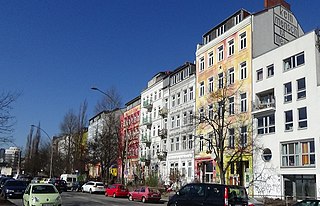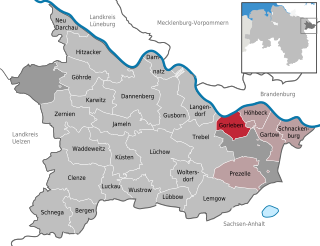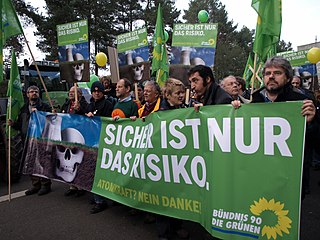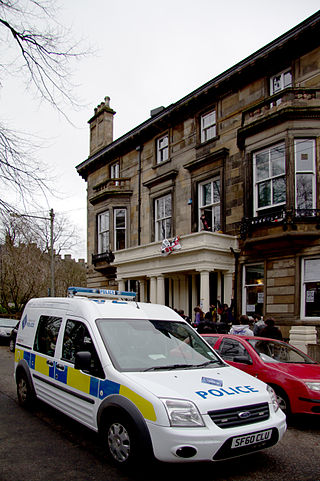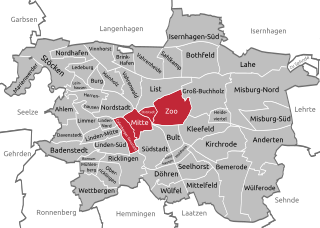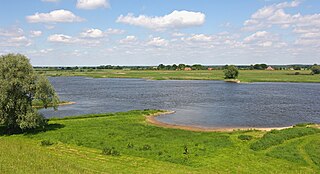History
Background
The Physikalisch-Technische Bundesanstalt conducted drilling in Gorleben in 1979 to test the salt domes there for suitability in storing radioactive waste. After small occupations by local activists at drill sites 1002 and 1003 failed, a plan was set in motion for a bigger occupation action that would include international anti-nuclear activists. A new demonstration was called for on 3 May 1980, under the motto "Day of action for the Wends" (Kampftag der Wenden).
Occupation
Around 5000 anti-nuclear activists moved to the planned area around drilling site 1004, between the villages of Gorleben and Trebel. There they occupied the area as part of a protest against further drilling to store nuclear waste. During the occupation, the so-called "Underground Office of Gorleben-Shall-Live" (Untergrundamt Gorleben-Soll-leben) declared the occupied area as an independent nation, naming it the Free Republic of Wendland (Republik Freies Wendland). The Lower-Saxon Minister of the Interior Egbert Möcklinghoff declared this proclamation to be high treason.

The site was created on sandy soil and burned trees that was destroyed during the Fire on the Lüneburg Heath in 1975. On this location, the protesters built over the course of several days a village of around 110 huts, made from wood and clay, which was a typical style of protest for anti-nuclear activists at the time. [1] Among the buildings were numerous community facilities, such as the 100-person-capacity Friendship House, greenhouses, an infirmary, a hairdressing salon and an area for waste disposal. There was also a sauna and bathing facilities. Water was piped in by a wind-powered well and warmed with solar power.
On the approach to the "republic", a border checkpoint with a boom barrier was built, over which the flags of the Wends and of the Anti-Nuclear-Sun were hoisted. [2] In the nearby information center, a Wends Passport (Wendenpass) could be issued, along with an entry stamp, for 10 Deutsche Marks. In the words of the occupiers, the passport was good "for the entire universe [...] so long as its owner could still laugh." [3]
Community life
The roughly 1000 permanent occupiers organized community life during the 33-day occupation around a model of grassroots democracy. They established a spokespersons council and made decisions in regularly occurring mass meetings. Regarding their possible eviction by police, the widespread consensus was that of passive resistance, though a few militant occupiers spoke against this course. On the weekends, several thousand sympathizers and sightseers came to the occupied site, among them prominent people, such as the former head of the "Young Socialists", Gerhard Schröder. Other well-known visitors and residents included the resistance fighter Heinz Brandt, the musicians Walter Mossmann and Wolf Biermann, the photographer Günter Zint and the SPD politician Jo Leinen, as well as the writer Klaus Schlesinger. The group decision-making process took place both in the Friendship House as well as at other equally suitable platforms. These places also hosted lectures, discussions, readings, rock concerts, and puppet shows. Residents of the surrounding region supported the occupation with food and timber. [4] On 18 May 1980 Radio Free Wendland began a pirate radio broadcast from a tower at the occupation site.
Eviction
On the morning of 4 June 1980 the occupation site was cleared by the Lower Saxony police and the Federal Border Guard on the order of Chancellor Helmut Schmidt. Around 3500 officers took part in the operation, according to the Lower Saxony Ministry of the Interior and of Sports. [5] Legal grounds for the eviction of the occupiers were based on violations of various laws, including forestry laws, building regulations, the Field and Forest Planning Act, and the Registration Act. By the time of the eviction, around 2000 occupiers had gather in the village's central square for a sit-in style protest. The eviction, during which many of the squatters were carried away by police officers, went largely peacefully. [6] The pirate radio broadcast Radio Free Wendland reported on the eviction from its tower throughout the day. Once finished, the police thanked the demonstrators over a loudspeaker for their nonviolent approach. [7]


